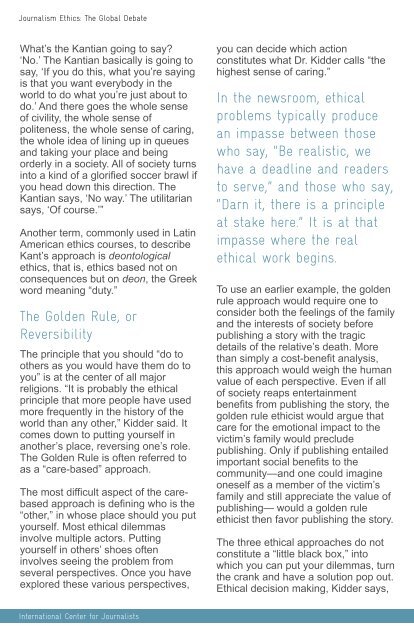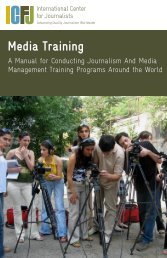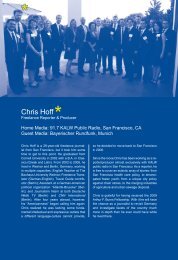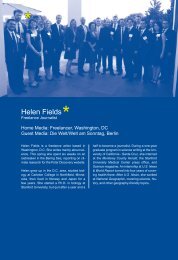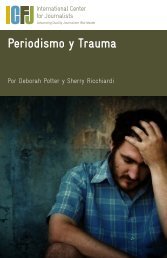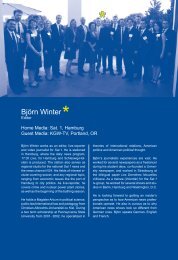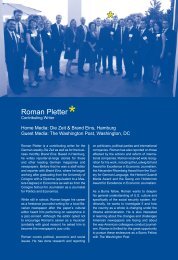Download PDF - International Center for Journalists
Download PDF - International Center for Journalists
Download PDF - International Center for Journalists
You also want an ePaper? Increase the reach of your titles
YUMPU automatically turns print PDFs into web optimized ePapers that Google loves.
Journalism Ethics: The Global Debate<br />
What’s the Kantian going to say?<br />
‘No.’ The Kantian basically is going to<br />
say, ‘If you do this, what you’re saying<br />
is that you want everybody in the<br />
world to do what you’re just about to<br />
do.’ And there goes the whole sense<br />
of civility, the whole sense of<br />
politeness, the whole sense of caring,<br />
the whole idea of lining up in queues<br />
and taking your place and being<br />
orderly in a society. All of society turns<br />
into a kind of a glorified soccer brawl if<br />
you head down this direction. The<br />
Kantian says, ‘No way.’ The utilitarian<br />
says, ‘Of course.’”<br />
Another term, commonly used in Latin<br />
American ethics courses, to describe<br />
Kant’s approach is deontological<br />
ethics, that is, ethics based not on<br />
consequences but on deon, the Greek<br />
word meaning “duty.”<br />
The Golden Rule, or<br />
Reversibility<br />
The principle that you should “do to<br />
others as you would have them do to<br />
you” is at the center of all major<br />
religions. “It is probably the ethical<br />
principle that more people have used<br />
more frequently in the history of the<br />
world than any other,” Kidder said. It<br />
comes down to putting yourself in<br />
another’s place, reversing one’s role.<br />
The Golden Rule is often referred to<br />
as a “care-based” approach.<br />
The most difficult aspect of the carebased<br />
approach is defining who is the<br />
“other,” in whose place should you put<br />
yourself. Most ethical dilemmas<br />
involve multiple actors. Putting<br />
yourself in others’ shoes often<br />
involves seeing the problem from<br />
several perspectives. Once you have<br />
explored these various perspectives,<br />
you can decide which action<br />
constitutes what Dr. Kidder calls “the<br />
highest sense of caring.”<br />
In the newsroom, ethical<br />
problems typically produce<br />
an impasse between those<br />
who say, “Be realistic, we<br />
have a deadline and readers<br />
to serve,” and those who say,<br />
“Darn it, there is a principle<br />
at stake here.” It is at that<br />
impasse where the real<br />
ethical work begins.<br />
To use an earlier example, the golden<br />
rule approach would require one to<br />
consider both the feelings of the family<br />
and the interests of society be<strong>for</strong>e<br />
publishing a story with the tragic<br />
details of the relative’s death. More<br />
than simply a cost-benefit analysis,<br />
this approach would weigh the human<br />
value of each perspective. Even if all<br />
of society reaps entertainment<br />
benefits from publishing the story, the<br />
golden rule ethicist would argue that<br />
care <strong>for</strong> the emotional impact to the<br />
victim’s family would preclude<br />
publishing. Only if publishing entailed<br />
important social benefits to the<br />
community—and one could imagine<br />
oneself as a member of the victim’s<br />
family and still appreciate the value of<br />
publishing— would a golden rule<br />
ethicist then favor publishing the story.<br />
The three ethical approaches do not<br />
constitute a “little black box,” into<br />
which you can put your dilemmas, turn<br />
the crank and have a solution pop out.<br />
Ethical decision making, Kidder says,<br />
<strong>International</strong> <strong>Center</strong> <strong>for</strong> <strong>Journalists</strong>


